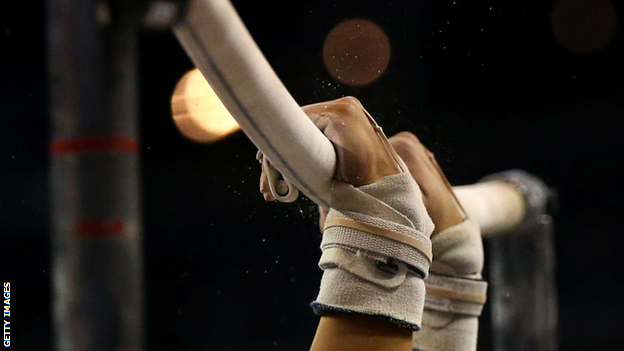The Whyte Review: Welsh Gymnastics appoints safeguarding adviser Jan Pickles after report
- Published

The Whyte Review covered a 12-year period up to August 2020
Welsh Gymnastics has appointed a safeguarding adviser in response to the findings of a report into "systemic" abuse within British gymnastics.
The Whyte Review, released on Thursday, found issues of physical and emotional abuse within British gymnastics.
Jan Pickles, who has performed a similar role for Welsh government, will now advise the Welsh Gymnastics board.
Welsh Gymnastics said "nothing is more important than the safeguarding and welfare of our gymnasts".
Pickles, a former member of the Welsh government's national independent safeguarding advisory board, is tasked with "ensuring any recommendations [of the Whyte Review] that may relate to Wales are fully implemented".
She is an experienced social worker and as well as her government position has worked in the Probation Service and the police, as well as being on the board of Velindre NHS Trust, the Contextual Safeguarding advisory board and the Centre for Expertise in Child Sexual Abuse advisory board.
The Whyte Review was co-commissioned by UK Sport and Sport England in 2020 following allegations of abuse and mistreatment within gymnastics in Britain.
The Review, which focused on the period from August 2008 to August 2020, received more than 400 submissions, including 133 from current and former gymnasts, and conducted 190 interviews.
Of those 400-plus submissions:
More than 40% described physically abusive behaviour towards gymnasts by coaches, including physical chastisement, inappropriate training on injury, overstretching to the point of distress and withholding food, water and access to the toilet.
More than 50% reported an element of emotional abuse by coaches, such as swearing, name-calling, use of belittling language and gaslighting.
Some 30 submissions included allegations of sexual abuse.
More than 25% included reference to excessive weight management.
The review states the "vast majority" of reports about physically and emotionally abusive behaviour related to female gymnasts, and such behaviour was more prevalent at the elite end of the sport.